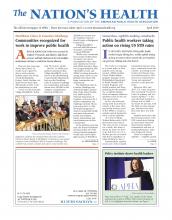Not enough U.S children are receiving their HPV vaccinations at an early age, placing them at heightened risk for contracting the sexually transmitted virus later in life and being diagnosed with an HPV-related cancer, according to a recent study.
Only 16 percent of children in the U.S. have been vaccinated for HPV before age 13, said the study, published in January in the Journal of Infectious Diseases. The recommended age for HPV vaccination is 11 or 12, though vaccination can begin at age 9, according to the Centers for Disease Control and Prevention.
For the study, researchers from Emory University reviewed data on HPV vaccine rates from CDC’s 2016 National Immunization Survey-Teen. Reviewing vaccination records of over 20,000 people ages 13 to 17, the researchers found that almost half, or 43.4 percent, were fully vaccinated against HPV. But only 16 percent of those in the study had received the vaccination before they turned 13.
HPV vaccination by age 13 offers many health advantages, the researchers said. The immune system response to the vaccine is much stronger when inoculation occurs before adolescents reach puberty. If vaccinated before age 15, teens need only two doses of the HPV vaccine, rather than three.
Also, inoculating people before they are sexually active lowers the possibility that they will contract the virus in their teen and adult years. According to CDC’s National Survey of Family Growth, 11 percent of girls and 35 percent of boys have sexual intercourse before age 15. Complicating matters, unlike most STDs, HPV can be transmitted by skin-to-skin contact, the study said.
“With many adolescents considering digital-genital contact or oral sex activity as marking a loss of virginity or abstinence, unvaccinated adolescents may not recognize the risk of HPV transmission from these sexual activities, potentially exposing them to HPV even if they do not consider themselves sexually active,” the researchers said.
Adolescents can also receive the HPV vaccine at the same time they receive vaccines for tetanus, diphtheria and whooping cough — all recommended by CDC to take place between ages 11 and 12.
Eighty million people in America have HPV, and every year about 34,000 are diagnosed with an HPV-related cancer, the researchers said. HPV places women at risk for cervical, vulvar and vaginal cancers, and men at risk for penile cancer. Both genders are at risk of anal, mouth or throat cancer from the infection.
“Providers need to be aware that while we have seen gains in HPV vaccination coverage, we are still falling behind at the younger ages,” said Robert Bednarczyk, PhD, an assistant professor at Emory University’s Rollins School of Public Health and lead author of the study, in a news release. “In general, we need to do a better job of recommending the HPV vaccine at the routine, adolescent and well-child visits, with a particular focus on 11 to 12 years of age.”
Parents sometimes resist having their children vaccinated for HIV, but health providers can influence their decisions if they take the right approach, according to a February study in Pediatrics.
The study involved about 1,200 parents who were reluctant to vaccinate their children and teens for HPV. Researchers recorded each parent’s reaction to one of four videos created to address common concerns parents raise.
They found that when providers stressed urgency about their child being vaccinated, parents remained skeptical. But when providers highlighted how the vaccine can protect against certain cancers, parents were more likely to allow their child to be vaccinated. Parents also responded positively to longer conversations with providers about the HPV vaccine.
The researchers say providers need to take time to answer questions about and explain the health benefits of the HPV vaccine to reluctant parents.
For the Journal of Infectious Diseases study, visit https://academic.oup.com/jid/advance-article/doi/10.1093/infdis/jiy682/5265326. For the Pediatrics study, see http://pediatrics.aappublications.org/content/143/2/e20181872.
- Copyright The Nation’s Health, American Public Health Association









